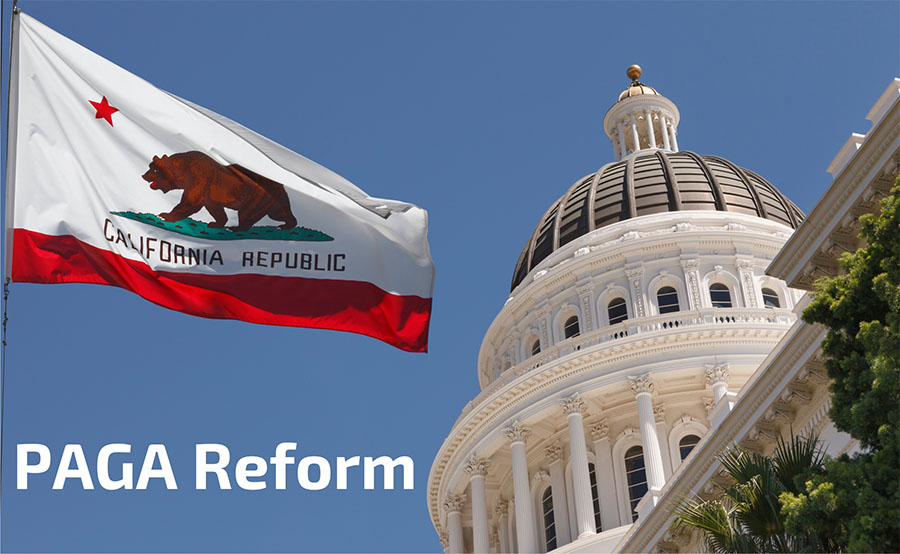
On July 1, 2024, Governor Gavin Newsom signed two pieces of legislation that greatly transformed the Private Attorneys General Act of 2004 (PAGA). The legislation reform was a result of an agreement reached between Governor Newsom, California labor, and business groups on June 18th that will keep an initiative seeking to repeal PAGA off the November ballot.
Key Changes in The PAGA Reform:
- Mandate that employees need to directly suffer the alleged violations filed in the claim. The claim also needs to be filed within a year of the violation.
- Set limits on penalties for employers that rapidly rectify policies and practices and adequately compensate workers after receiving a PAGA notice and those that undertake proactive measures to adhere to the Labor Code before a PAGA notice.
- Enforce heightened penalties on employers who engage maliciously, fraudulently, or oppressively in violating state labor laws.
- Offer a more comprehensive right-to-cure mechanism through the [LWDA] to minimize litigation and associated costs.
The experienced employment attorneys at Shimoda & Rodriguez Law, PC have the knowledge and expertise to adapt your case to the new PAGA reforms.
PAGA Background
The Labor Code Private Attorneys General Act (PAGA) was enacted in 2004 to bolster the enforcement of California labor laws. Designed to authorize aggrieved employees to file lawsuits and recover civil penalties for Labor Code violations, PAGA has been a potent tool for workers seeking justice. Recently, Governor Newsom signed into law a significant reform to PAGA, marking a new era in employment law.
What the New PAGA Reform Means for Employees & Employers
The PAGA reform brings about significant changes to the PAGA landscape for both employees and employers. Key among these changes are the amendments to early evaluation and cure options, standing requirements, penalties, and measures to ensure that PAGA actions remain manageable.
Early Evaluation and Cure Options
The reform introduces a new procedure allowing employers to address and cure alleged Labor Code violations following a PAGA action complaint. Under this early evaluation conference option, both the employer and PAGA plaintiff submit confidential statements detailing their perspectives and settlement demands. If a neutral evaluator accepts an employer’s cure proposal and the cure is made, PAGA penalties can be significantly reduced.
Furthermore, from October 1, 2024, employers with fewer than 100 employees can preempt a PAGA action by curing with the Labor & Workforce Development Agency alleged Labor Code violations upon receiving a PAGA notice.
Changes to Penalties
The reform reshapes PAGA’s penalty structure to strike a balance between enforcement and fairness. Among the changes, penalties for good faith compliance and wage statement violations are capped, penalties for derivative violations are reduced, and employers who successfully cure violations can benefit from reduced penalties. Moreover, the amount of penalty money allocated to employees increases from 25% to 35%, directing more of the recovered penalties to the workers directly affected.
Standing Requirements
The reform establishes stricter standing requirements for PAGA plaintiffs. For success in a PAGA claim, an employee must have personally experienced each of the Labor Code violations alleged in the lawsuit within the one-year period prior to the PAGA notice.
Manageability
The reform aims to ensure that PAGA actions remain manageable. Courts are granted the discretion to limit the scope of PAGA claims and evidence presented at trial. Also, PAGA actions involving overlapping violations against the same employer may be consolidated or coordinated when necessary.
For employees, the reform has implications on how lawsuits are brought forward and the range of violations they can claim. For employers, especially smaller businesses, the reform provides opportunities for dispute resolution and policy rectification without escalating to costly litigation. At the intersection, legal firms like Shimoda & Rodriguez Law are poised to guide both parties through the procedural, tactical, and strategic dimensions of PAGA claims under this new legal landscape.
Shimoda & Rodriguez Law Experience In PAGA Cases
Our firm has extensive experience in PAGA cases and the expertise to navigate the recent PAGA reform to ensure you receive fair treatment and compensation. Don’t hesitate! Reach out and take your first step towards justice. Call our office today at 833-201-0213 to request a consultation.

